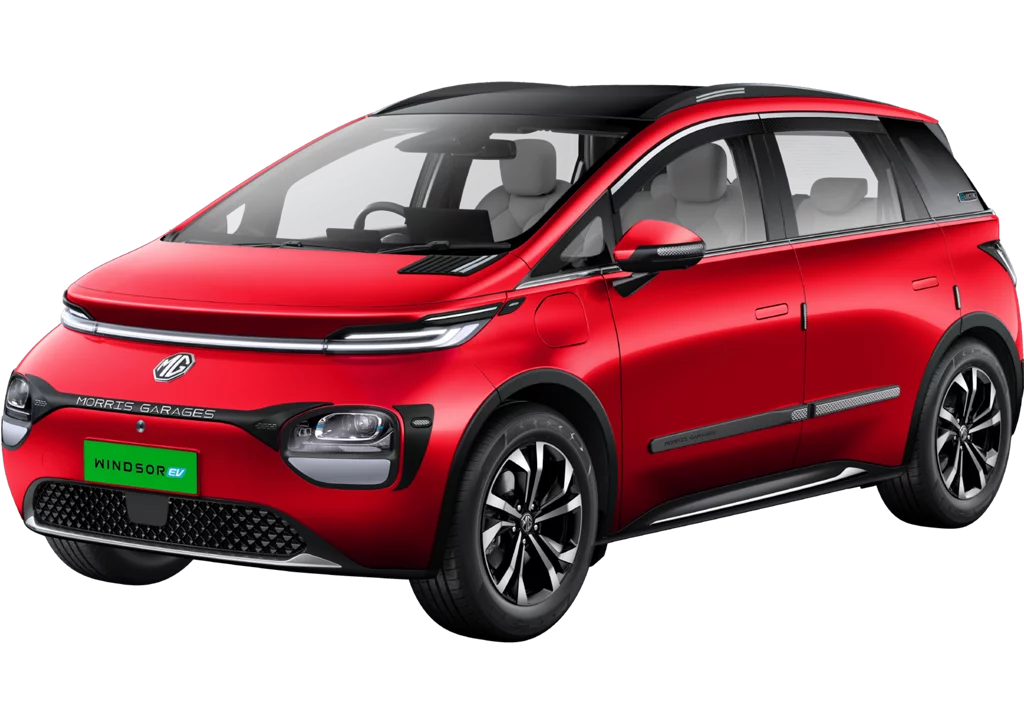Talk to anyone in India who’s even half-interested in buying an electric car, and you’ll hear the same question over and over again: “How long does it take to charge?” Range is important, sure, but at the end of the day, nobody wants to be stuck waiting by a charger when they’ve got places to be. And that’s exactly why the MG Windsor EV battery charging time in India has become such a hot discussion.
MG’s Windsor EV is still a fresh face, but it’s already drawing attention because it offers two different battery options. That means two different charging stories—one quicker and lighter, the other longer but with extra freedom. If you’re on the fence about which one to go for, or you’re simply trying to understand if this EV fits into your daily life, let’s walk through the numbers, the reality, and a few insights that don’t usually make it into the brochures.
Table of Contents
Two Battery Sizes, Two Kinds of Buyers
The Windsor EV comes with two packs: a 38 kWh lithium-ion battery and a 52.9 kWh lithium-ion battery. On paper, that looks like a simple choice—small or large. In practice, it’s more like picking between two lifestyles.
If you’re mostly driving to work, dropping kids to school, or hopping across town for errands, the 38 kWh pack will keep you covered. It’s smaller, lighter, and doesn’t take an eternity to refill. Think of it as the city commuter’s best friend.
But let’s say you’re the kind of driver who enjoys weekend getaways, or you don’t like the thought of charging too often. That’s where the bigger 52.9 kWh battery starts to make sense. You’ll wait longer to charge, but in return, you get more range in one shot. It’s like carrying an extra power bank for your phone—you don’t always need it, but when you do, it’s priceless.
MG Windsor EV Battery Charging Time in India: The Numbers That Matter
Alright, let’s talk real timings, because this is what most people care about. With the 38 kWh pack, if you plug into a 7.4 kW AC fast charger, a full 0–100% charge takes about 6.5 hours. That’s an overnight charge if you think about it—plug in before dinner, wake up with a full battery.
Now, if you use a 45 kW DC fast charger, things speed up dramatically. You can go from 0% to 80% in about 45 minutes. That’s roughly the time you’d spend at a highway food stop.
With the 52.9 kWh battery, charging is naturally longer. On the same AC charger, it takes around 9.5 hours for a full charge. But on a 60 kW DC fast charger, 0–80% is done in about 50 minutes. In other words, you don’t wait much longer on DC even though the pack is bigger, but AC home charging does stretch the timeline. And then there’s the old-school way: a 15A household plug point. Yes, you can charge from it, but it’s slow—easily 10–12 hours depending on which battery you pick. For city driving, that’s still fine, because most cars sit idle overnight anyway.
A Quick Snapshot
| Year | Battery Pack | Charging Method | Approx. Time | Source |
| 2025 | 38 kWh | AC Fast (0–100%) | ~6.5 hours | MG India |
| 2025 | 38 kWh | DC Fast (0–80%) | ~45 minutes | MG India |
| 2025 | 52.9 kWh | AC Fast (0–100%) | ~9.5 hours | MG India |
| 2025 | 52.9 kWh | DC Fast (0–80%) | ~50 minutes | MG India |
What Really Decides Charging Time?
Now here’s the thing: these numbers are averages. In real life, the MG Windsor EV battery charging time in India can change depending on a few practical factors.
First up, battery size. No surprises here—the bigger 52.9 kWh unit simply takes longer than the 38 kWh one. Next, the type of charger. A 15A plug at home versus a 60 kW public fast charger is like comparing a hand pump to a water motor—both work, but one’s going to get the job done a lot quicker.
There’s also the charge level. EVs charge rapidly up to about 80%, then slow down to protect battery life. That’s why manufacturers often give two different time estimates: 0–100% for AC and 0–80% for DC.
Finally, charger power itself matters. If you connect your Windsor EV to a 30 kW charger instead of a 60 kW one, you can’t expect the same speed.

38 kWh vs 52.9 kWh: Which One Makes More Sense?
| Feature | 38 kWh Battery | 52.9 kWh Battery |
| Pros | Charges quicker, costs less, ideal for cities | Longer range, better highway usability |
| Cons | Needs more frequent top-ups for long trips | Slower AC charging, pricier |
| Best For | Daily commuters, budget-conscious buyers | Families, long-distance drivers |
How It Feels in Daily Life
Let’s get out of the spec sheet for a moment. Imagine someone in Delhi or Bangalore with access to fast chargers at malls or workplaces. They’d mostly use overnight charging but top up at a DC fast charger before weekend drives. That’s convenient and doesn’t disturb their schedule.
Now think about a driver in a smaller city like Indore or Bhubaneswar. Charging infrastructure isn’t everywhere yet, so they’d mostly depend on home charging. A full overnight plug-in, even if it takes 10 hours, is still fine because the car sits idle anyway.
This is the reality: MG Windsor EV battery charging time in India is not just about numbers. It’s about whether those numbers fit into your lifestyle.
Wrapping Up
At the end of the day, the MG Windsor EV battery charging time in India boils down to this: the 38-kWh pack is faster and city-friendly, while the 52.9-kWh pack takes longer but gives you the confidence of extra range.
Either way, MG has given Indian buyers flexibility. Pair that with lower running costs, a strong 8-year warranty, and charging infrastructure that’s growing every month, and you can see why the Windsor EV is more than just a spec sheet car.
If you’re still debating whether it works for you, ask yourself this: do you want shorter charging times with more frequent top-ups or longer charging sessions with fewer stops? Answer that, and you’ll know exactly which Windsor to choose.
FAQs People Keep Asking MG Windsor EV Battery Charging Time in India
Which battery does the MG Windsor EV use?
Both versions use modern lithium-ion batteries, the same tech trusted across EVs worldwide.
How long will the battery last?
On average, you’re looking at 8–10 years, or about 1.5 lakh km, before capacity loss becomes noticeable.
Is there a battery rental option?
Not in India. The Windsor EV comes with the battery included in its price.
What’s the cost of the Windsor battery?
Rough estimates say ₹6–8 lakh for the smaller pack and ₹9–11 lakh for the bigger one.
How much does replacement cost?
A replacement could cost up to 40% of the car’s value, but honestly, most buyers won’t ever need it during the warranty period.
What about maintenance?
One of the biggest perks of an EV is very low running costs. With no engine oil, clutch, or exhaust system, expenses drop to basics like tires, brakes, and software updates.
What warranty does MG provide?
MG backs the Windsor EV battery with an 8-year or 1.6 lakh km warranty. That’s strong reassurance for first-time EV buyers.

Dattu Siddi is a Commerce graduate and automobile content writer with over 2 years of blogging experience. Based in Yellapur, Uttara Kannada (Karnataka), he focuses on delivering accurate, easy-to-understand car information using real-world calculations and practical comparisons. Through cardekho24, Dattu publishes clean, user-first automotive content—especially around EVs, budget cars, ownership costs, and real-life usage—to make car research simple, transparent, and trustworthy.
Pingback: 7 Impressive MG Windsor EV Base Model Features You’ll Love
Pingback: MG Windsor EV 5 Major Issues Shocking Truth Every Buyer Fear